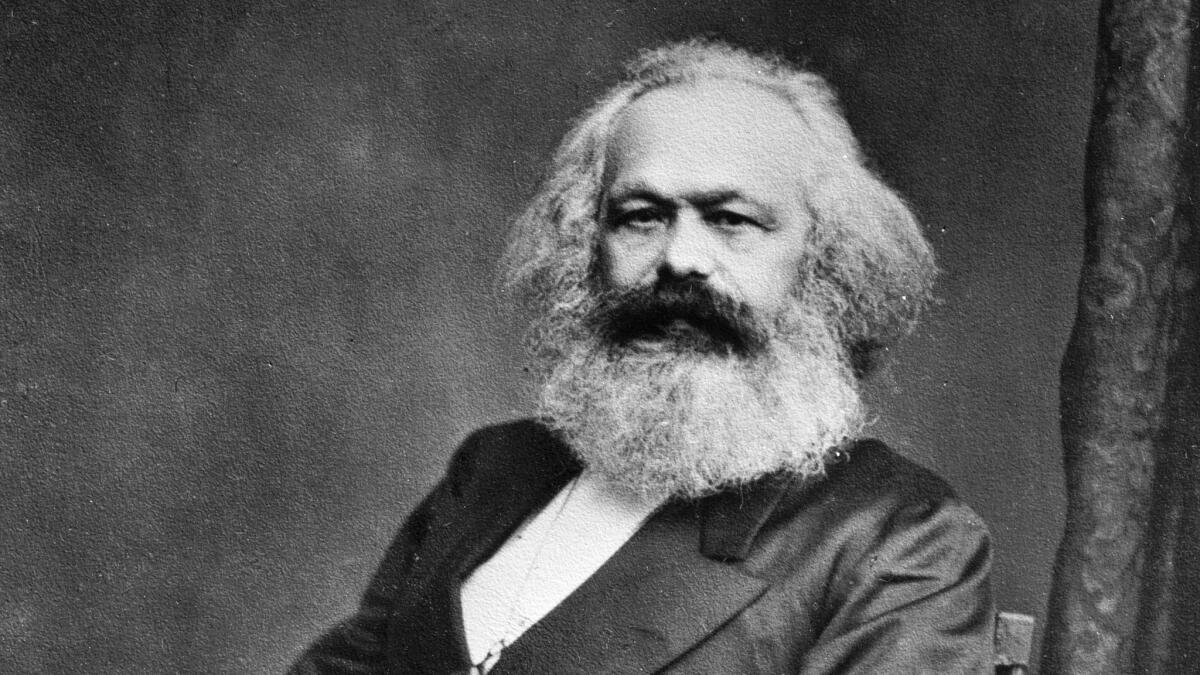Op-Ed: Even Karl Marx underestimated the economic anxiety of workers

The argument unfolding today in the United States between free traders and protectionists is nothing new, in kind or intensity. Long before President Trump called for tariffs to halt the departure of American companies, Alexander Hamilton called for the same to insulate American “infant” industries, especially cotton textile manufacturing, from the crushing superiority of British competition.
Neither is it new for opponents of protectionism to lethally underestimate the day-to-day economic anxieties of workers left behind by free trade. Indeed, the force of workers’ immediate fears was critically miscalculated by one early anti-protectionist — not a free trader, but rather capitalism’s most influential critic: Karl Marx.
As a young philosophy student in the early 1840s, Marx engaged in a number of debates taking place among radicals at the time — criticism of religion in Germany, campaigns for universal male suffrage in Britain and France, and new ideas about history as class struggle put forward by French liberals. He had not publicly discussed the matter of free trade when, in 1845, he attempted to review the economist Friedrich List’s newly published defense of protectionism, “The National System of Political Economy,” which drew on American arguments, first made by Hamilton, for the shielding of infant industries.
Marx’s social democratic vision of change was submerged by the wars and revolutions of the 20th century, but it is newly relevant ... today.
Intoxicated by the prospect of a world uprising, Marx accepted List’s warning about the “pauperizing” effects of free trade, but actually welcomed them as harbingers of revolution. Protectionism, he said, was merely an “artificial means of manufacturing manufacturers,” and of “forcibly abbreviating the transition from the medieval to the modern mode of production.” In January 1848, a month before he completed his “Communist Manifesto” and two months before revolution broke out across Europe, Marx concluded: “The free trade system hastens the social revolution. In this revolutionary sense alone, gentlemen, I am in favor of free trade.”
But as Marx would observe, widespread rebellion will not achieve wholesale societal change if revolutionaries remain preoccupied with short-term working conditions. The 1848 uprisings began promisingly, with the proclamation of a French Republic and the triumph of crowds over absolutist monarchies in Prussia and Austria. Within a few months, however, the old monarchies re-gained ground, in part because the wage-earner rebels were more focused on daily pressures than a visionary, communist mission. Efforts to channel Germany’s popular movement into a Jacobin-style political organization were a spectacular failure. Hopes that radical ideas might shape a great collective transformation were shattered.
In August 1849, Marx went to London and took a job as a European correspondent for the New York Daily Tribune. He was soon given another reminder of the day-to-day economic insecurities keeping workers from lofty revolutionary goals, very much including the early ills of globalization.
The American economist Henry Carey, who would later serve as an advisor to President Lincoln, sent Marx a copy of his newly published book, “The Slave Trade, Domestic and Foreign: Why It Exists, and How It May Be Extinguished.” In it, Carey cited Marx’s Tribune articles in support of his argument to protect American industry. Free trade privileged Britain’s status as the workshop of the world, Carey argued, but forced other countries to specialize in agriculture. “Factory slavery” in Britain perpetuated “plantation slavery” in the United States, he said, exacerbating the wealth gap in both countries.
Then as now, there was an uncomfortable overlap between the concerns of socialism and protectionism. Marx was shocked to be linked with protectionist sentiment. But he could not ignore the fact that his articles depicting English society aligned closely with the paper’s portrayal of the effects of free trade on American workers.
Though he was slow to accept the new political climate after 1848, by the mid-1860s, Marx had adapted his outlook. The way to challenge protectionism and therefore hasten a transition to socialism was not to shrug off workers’ fears, but to offer a principle of hope. Workers could promote their well-being through participation in the polity — “pressure from without,” as it was called at the time. True revolution would not be achieved by a spectacular event like the storming of the Bastille, but through a more piecemeal process.
After all, the transition from feudalism to capitalism had taken more than two centuries. The transition to socialism would be a similarly multifaceted progression, one that would require cooperative production, new forms of joint-stock companies, political reform that enfranchised working classes, legislation to limit the working day, and the legal recognition of trade unions.
Marx’s social democratic vision of change was submerged by the wars and revolutions of the 20th century, but it is newly relevant in the uncertain world of today. The grievances and discontents that drew so many to Donald Trump and attracted so many young people to Bernie Sanders should not be dismissed. Rather, the priority must be to re-energize democratic institutions by encouraging a greater participation by these voters. Only then will the appeal of crude protectionism be diminished.
Gareth Stedman Jones is a professor of history at Queen Mary University in London, the director of the Center for History and Economics at the University of Cambridge, and the author of “Karl Marx: Greatness and Illusion.”
Follow the Opinion section on Twitter @latimesopinion and Facebook
More to Read
A cure for the common opinion
Get thought-provoking perspectives with our weekly newsletter.
You may occasionally receive promotional content from the Los Angeles Times.






